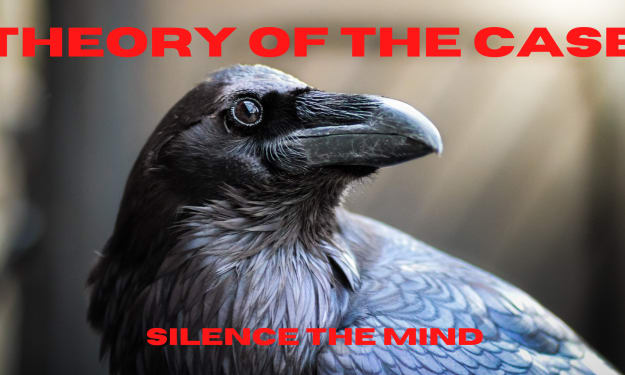
THE TWELFTH EXCERPT FROM DR. JAGEN'S BLACK JOURNAL:
We have sat in silence for close to a year.
A whole year the child has made me wait to hear its first words.
It has done nothing more than sit across the table in its straitjacket, malevolent intent in its eyes. It stares at me as if it wishes to see me dead. Saying nothing.
It shows recognition when I ask questions. I can see answers generating in its mind. But it doesn't vocalize them. Harbors them to itself.
I don't know what made today any different.
Today it spoke to me for the first time, and I now know that it is not a human soul that resides within the child's body. It is something diabolically different. Something much more malevolent.
It must be. A child doesn't speak with such wickedness.
I had one simple task going into today's session with the child, as I have with every previous session over the course of a year.
I set forth to prove that it is not black-level by judging it with the measuring guidelines for a brown-level.
This was not easy. First I had to define for myself what sets a brown-level patient apart from a black-level. And I have never come face to face with a black-level patient, so my lack of experience made this even more difficult.
I set up a theory before entering the session. A hypothetical set of parameters that define what I think all brown-level patients possess.
The brown-level encompasses most psychopaths and sociopaths, but there are still quantifiable characteristics that can be extracted from such emotionless beings.
For one, they still maintain a sense of self-identity. Whether or not the identity they hold is delusion or reality, they can speak with an assured sense of self-awareness. They are hollow men and women, but they are still aware of their own existence.
So that is the first measure I sought to pry from the child patient.
It did not go as I desired.
I asked it, "How are you today?"
Such a question is beyond basic, so much so that it paints me as ignorant. The question implies that I assume the child feels anything at all, which is likely not the case. Eyes devoid of emotion such as this child's obviously feel no emotion. But the question still gets to the underlying theme of identity. If one can basically answer how they are feeling, even with the slightest shrug of nonverbal indifference, it implies that they still exist.
But my question elicited no answer from the child. In fact, it caused the opposite.
The child answered my question with a question.
"How does the starless sky feel when the moon goes dark, Dr. Jagen?"
To hear the child's voice had an effect that was twofold. It startled me, after all this time asking questions I had grown used to receiving silence as a form of response. Grown used to recording its nuanced facial expressions and calculating eyes. But more than that, the pitch of the child's voice caught me off guard. It was not deep and inflected with baratone as I had fantasized it would be. It was exactly how a child of seven years would be expected to sound. Innocent. High-pitched. Nasally.
To which I carefully replied: "Rather dark, I'd imagine. The sky has grown used to having some form of light in its presence all these years."
The child nodded, as if I'd answered its question correctly.
"But that doesn't answer my question. I'd like you to try to tell me how you feel, if you're feeling anything at all."
"Oh, I feel alright," the child wheezed, almost as if it my words were some joke that aroused humor. A smile possessed its demonic face. A smile that was unnaturally wide.
I proceeded for it to continue speaking with my prolonged silence. The light above our heads flickered. Or maybe it was my imagination?
No, it definitely flickered slightly. Long enough for the smile on the child's face to disappear in the blink of an eye. Now its face was plain, not the slightest trace of a wrinkle from its previous smile.
"I feel as the raven does, when a child rips its wings off and throws it from the roof of their house."
The statement was unsettling for a whole slew of reasons. Breaking such a comment down to find the origin of its meaning would take hours of relentless parsing.
But to hear a seven-year-old use such language—I think that's what frightened me most. A child so young shouldn't possess such sophisticatingly gruesome analogies.
"I feel as a parent does, when they see their child holding a bloody knife, a torrent of blood gushing from their slashed throat."
"That's enough," I replied. But it was too late. The child was treating my question like a joke, and it laughed appropriately.
Well, laughter is not the right word.
Howled. Cackled. Lament-filled laughter. Something along those lines.
Tears willingly fell from the corner of its eyes. Tears of joy at the memory of its parents' deaths. Deaths at its own hands. Like the death held some sweet and savory place in the child's most cherished recollections.
The lights cut off. Darkness. Much longer than a flicker. The laughter ceased.
Then the light returned. And the smile was gone. No lines of laughter remained on the child's face. No evidence of tears ever falling. Just an emotionless child in a straitjacket, glaring deeply into my eyes with menacing intent.
Its jaw moved side to side, grinding its teeth together to fill the silence with the sound of bone scraping bone.
Onto the next question.
A brown-level patient oftentimes still possesses an innate desire to find purpose, as most humans do. Even those who are unaware of what their purpose are, they still know one may exist. Even if they perceive their purpose to be dark, or perverted, or maniacal, they believe in the power of purpose. Find conviction in its causality.
For some, they earnestly believe they are here to kill. View themselves as predators in a world filled with sheep. This is an awful way to view life, but still, it is better than having no purpose at all. I can rehabilitate a man who thinks he was put on earth to kill others. I cannot, however, rehabilitate a man whose killing spawns from a place devoid of principle.
"Why did you kill them?"
A question that cuts through formalities and leaves the child with no option but to answer with straightforwardness. If it wants to dodge my questions with nonsensical riddles then I will avoid casual conversation.
"Oh darling Jagen, I'm afraid you'll need to be more specific than that," the child said. The words are etched in verbatim in my mind. A child should not speak like this one does. I don't embellish in my recording of the conversation.
Normally I have to work hard to remember the things said in exchange with a patient. Not with this one though. Its speech sears my mind with sinister subjection.
"Do you know what you are?" the child asked shortly thereafter, dodging my question altogether.
"You are a squirrel, Dr. Jagen. A creature who clings to the side of the road waiting to cross. Why is it that you wait for the first sign of danger to come before you dart across? Why is it that you fling yourself before a speeding car when you could have crossed peacefully at another time?"
The child shifts forward, its entirely black eyes an extremely disturbing sight for me to behold from such proximity. With nothing but seriousness in its tone it continued, "You could have passed into the afterlife peacefully, but instead you insist on coming before me. I will make you pay for this, as I did with all those who came before you."
The corner of the child's mouth twitched repeatedly, and the light flickered in synchronization.
I am well-aware of the child's bodycount. It was at the very top of the file given to me when I took this case on. An in-depth report of every known murder accompanied by a hodgepodge of psychological analyses done by various therapists that have sat down with the kid. Therapists that are now dead.
I am the fifth clinical professional that has sat down to assess the child. I am also the longest-spanning survivor. All those that dropped dead in the child's wake lasted less than a few short months.
"Why would you kill me?" I asked the question without hesitation, and I showed no fear in my tone as I asked it. It was a rephrasing of the earlier question. An attempt to determine the child's purpose, or recognition of intent.
But as with all questions I asked the kid, it did not reach its desired effect.
"It is not me that will kill you, Dr. Jagen. Surely you know that by now."
The lights overhead cut off. I'll be damned if I omit that from this journal. Damn my infernal superstition to hell, they light cut off with no efficient cause. It left me in darkness, alone with the child.
I felt something stirring in the shadows. I must leave professionalism aside if I'm to record this accurately. All who look upon these words may judge me accordingly, but I was the one in the room, not you. If you had been there, you would be hesitant to call me a raving lunatic. Who knows what it would have been that you would have seen in the shadows.
But I know what I saw, and when the light turned back on, I saw the monster with horrifying clarity.
When the lights flickered back, it was the child's shadow that caught my eye. It stretched unnaturally against the wall behind it. Except it wasn't the sillhouette of a child. It was grotesque and gruesome. And unlike a shadow, it revealed too many details to have been considered a shaded portrayal of the child's outline.
And worse, it swayed ever so slightly while the child sat still.
I saw all of this in a brief moment before the lights flickered again, and in the blink of an eye the shadow was gone. As if it was some optical illusion meant to drive me mad. Some otherworldly predator set to drive fear into its prey.
"Is it your imaginary friend that will kill me? It was recorded by your previous psychiatrist that you claimed it was your imaginary friend who did the killings."
And then the lights cut off once more. The child whispered, it's voice a hiss like a feral cat.
"Ah, is that what he wrote I said?" The child's question was rhetorical, speech laced with malevolent curiosity. The kid was musing in the dark. Subsequent goosebumps rose upon my skin, and not for lack of trying to maintain composure.
And then the child whispered again, almost so low that it was nearly undetectable, "I never said anything about it being imaginary."
The lights in the room cut back on and the shadow upon the back wall did not reappear. Almost as if it had never existed in the first place. Almost as if I had gone crazy in the presence of the child.
But I know what I saw.
The child is a predator, but I am not hunted physically. The kid seeks to break me mentally—to convince me I've gone insane. To make me fall prey to my superstition like those who came before me. But I will not allow it. After a year I've finally got it to speak. It is opening up to my presence, and the mind games it plays with me will only get worse from here.
I have not given up on this child. Not yet.
But I must be ready for the eventuality that may come.
Must be ready to admit that this child may be Morally Irredeemable.
But that day has not come, so I left the child where it sat and ended the session there. Partly out of fear and loss of composure, partly because I knew I had lost control over the flow of conversation, something unacceptable in a setting with a mentally unstable patient.
I left the child and marched straight to the custodian's office. I need to be better prepared for my next session with the child, and that starts with changing the damn lightbulb in his cell.
It will be impossible to make any progress with this child if our sessions are spent in the flicker of darkness.
-Dr. Jagen
About the Creator
Devin Thorpe
I am a 22-year-old recent graduate from Mars Hill University. I have a double major in Criminal Justice and Religion & Philosophy. I also played collegiate lacrosse! In my free time you can find me writing fiction and hiking with my dog.






Comments
There are no comments for this story
Be the first to respond and start the conversation.